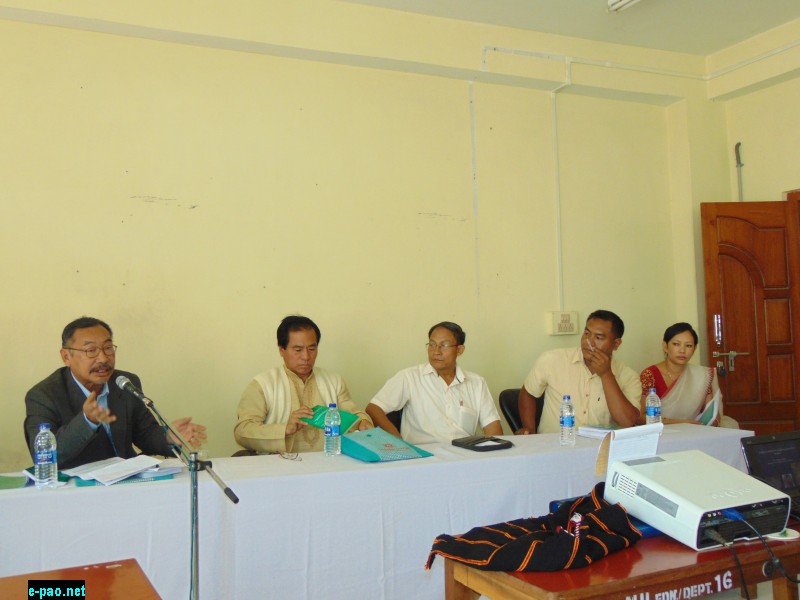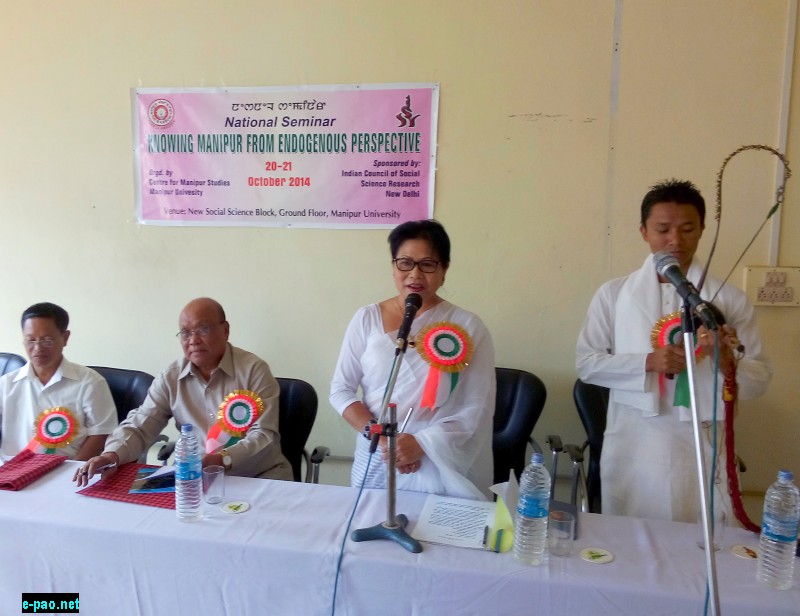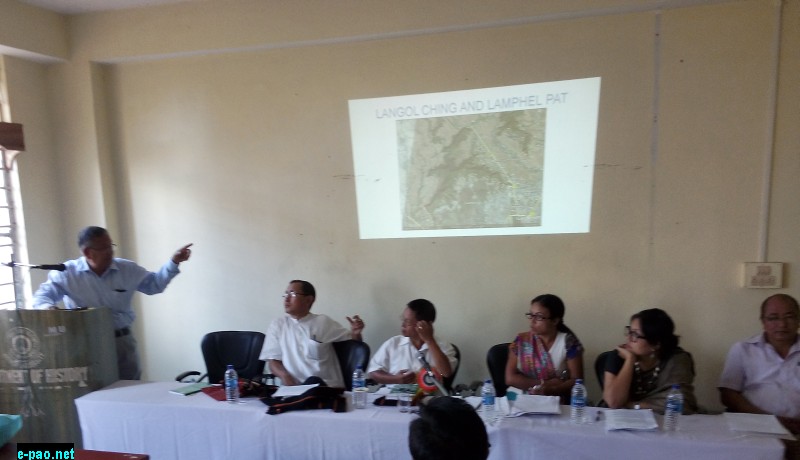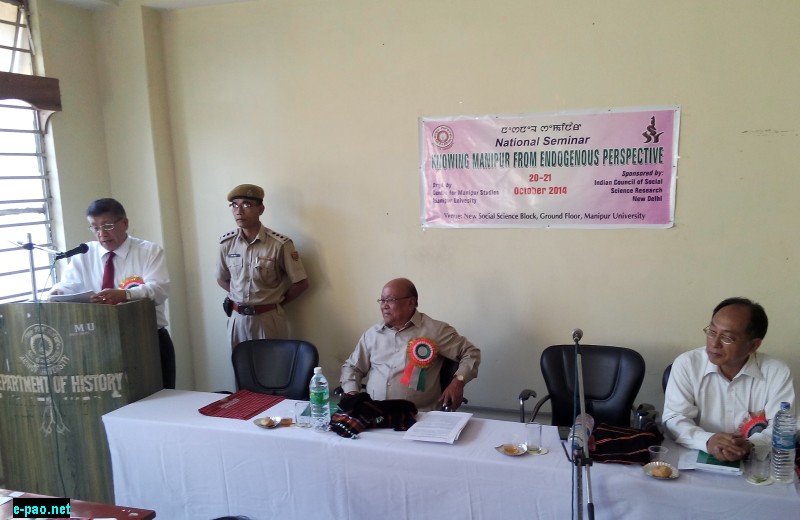Seminar : Knowing Manipur from Endogenous Perspective : Rapporteur Report
- Day 2 -
Homen Thangjam *

Seminar : Knowing Manipur from Endogenous Perspective on October 20-21
Day Two, Tuesday, the 21st October, 2014
Second day of the Two Days National Seminar on Knowing Manipur from the Endogenous Perspective, organized by the Centre for Manipur Studies and sponsored by the Indian Council of Social Science Research was held on Tuesday, the 21st October, 2014 at the New Social Sciences building, Manipur University, Canchipur.
The first session of the second day was Chaired by Dr. L. Muhindro, Senior Fellow, ICSSR, N. Delhi. 9 (nine) resource persons presented papers.
The first paper titled FESTIVALS IN THE NOMENCLATURE OF LUI NGAI NI was presented by Dr. Aheibam Koireng. The paper discusses how the Nagas in Manipur started feeling the need to have a common festival day of their own in the mid 80s of the passing twentieth century which eventually led to the manufacturing and observance of Lui Ngai Ni after considering various other possible names. The paper gives an exhaustive description of the three festivals which constituted the nomenclature of Lui NgaiNi.
Dr. O. Ranjit Singh presented a paper titled MARRIAGE OF THE MEITEIS IN THE ANCIENT TIMES . He assessed the marriage of the Meiteis in the ancient times or nature and forms of early marriage in Manipur.
Bosco Jaiche presented a paper titled HOW THE YEAR ENDS: FESTIVAL OF THE KHARAM COMMUNITY. In this paper, he highlights the ways and how the particular festival of Kumri Katan is celebrated. While drawing attention that the festival is no longer celebrated by the Kharam tribe today, and many other festivals are also slowly vanishing away partly due to their contribution to Christianity, the paper cautions that if preservation of these rich cultures is not done in time there is a possibility of the Kharam tribe eventually losing its identity.
S. Jayalaxmi & W. Dhiren presented a paper titled TRADITIONAL MARRIAGE SYSTEMS OF THE KHARAM TRIBE OF MANIPUR. The paper delved deep into the traditional marriage systems of the Kharam of Manipur. It discusses about the different ways of obtaining a spouse: arranged marriage, preference marriage (between one’s mother’s brother’s daughter), and love marriage (elopement) and associated rites and ceremonies.
Leivon Jimmy Kom presented a paper titled REVISITING THE KOM REM TRADITIONAL ADMINISTRATIVE SYSTEM. The paper argues that traditional administrative institutions continue to play a key role in the lives of the tribal people and more so with the Kom Rem. It discusses about the classical dilemma of harmonizing continuity and change by way of retaining the traditional political institutions while welcoming newer democratic machineries and institutions.
Dr. Thangtungnung presented a paper titled TRADITIONAL SYSTEM OF PAITE SOCIETY IN NORTH EAST INDIA. The paper highlights the various traditional institutions and structures of the Paite society. It explores the tribal rituals, sacrifices and beliefs and attempts to study those tribal values as many of them have been discarded today. It concludes by emphasizing the necessity to preserve the customs and cultures of the tribe under study.

Seminar : Knowing Manipur from Endogenous Perspective on October 20-21
Dr. M. Ningshen presented a paper titled TRADITIONAL ADMINISTRATIVE SYSTEM AND RELIGION OF THE TANGKHUL IN MANIPUR. The paper gives an exhaustive description of the power, functions and privileges of institution of Chieftainship (Awunga), council of village elders (Hangva); and the religion practiced by them which they had completely abandoned after their conversion to Christianity.
Ms. Hoipi Haokip presented a paper titled GENDERED SPACE IN THADOU-KUKI CUSTOMARY LAWS OF MANIPUR. The paper describes the intrinsic socio-cultural customary laws of the Thadou-Kuki society wherein women are the centrifugal of the customary laws, and further attempts to explore the significance of such customary laws on women and the underlying implications on society.
Dr Grace Laltlinzo presented a paper titled TRADITIONAL RELIGIOUS BELIEFS AND PRACTICES OF THE HMAR. The paper highlights that Hmars have a strong belief in an omnipotent, omniscience and omnipresent God whom they called Pathien. They also believe that their live were constantly affected by the evil spirits and they would blame anything they don’t understand to be the work of an evil spirit. Yet at the same time, they also realize that there are some benevolent spirits who would stand by them.
The next Session was chaired by Dr. Arambam Lokendra, Former Director, AVRC, Manipur University, Canchipur. 9 (nine) resource persons presented papers.
Prof. P. K. Singh presented a paper on TRADITIONAL KNOWLEDGE SYSTEM AND PRACTICE OF FOLK MEDICINAL PLANTS OF MANIPUR. While giving detailed account of the folk medicinal plants in its various forms of applications conceived that Meiei despite its smallness in population size, can continue to survive even in this modern scientific world because of its traditional knowledge system of using Indigenous Herbal Medicine system. It concluded with a word of caution that there is no any scientific approach of the local healers regarding the ideas, dosage, nature, side effects, standardization, etc. of the medicines plants of the state is very little.
Dr. Sushma Phurailatpam presented a paper on TKS WITH REFERENCE TO MEDICINAL PRACTICES OF MAO AND CHOTHE COMMUNITIES IN MANIPUR. The paper documents and assesses the plant based medicines used by Mao and Chothe Communities in Manipur along with its therapeutic indications, part used, preparation and its names in botanical, vernacular and Manipuri. While expressing concern that traditional knowledge system associated with tribal medicine is waning, it emphasized the urgent need of executing a revitalization strategy for protecting the Indigenous knowledge from complete desertion.
Amal Sanasam presented a paper on THE INDIGENOUS KNOWLEDGE OF SALT MANUFACTURING IN MANIPUR. The paper highlighted the importance of indigenous salt right from the early period till the present day Manipuri society emphasizing not only the traditional knowledge system of the community but also their relevance to the socio-economic and religious sphere of Manipuri society.
Prof. N. Rajmuhon presented a paper on NEED FOR REVITALISATION OF DYEING SYSTEM IN MANIPUR. The paper while expressing concern for the inevitability of keeping the traditional health care and dyeing systems of Manipur alive and thriving not only for the present generation but also for the posterity, gives an exhaustive insight of the methods, procedures and materials involved and needed for vegetable dyes with particular reference to the Kum. It is also emphasized the need for a multi pronged effort by way of sensitizing through suitable promotion and publicity so as create awareness of availability and promotion of fabrics items created with natural dyes, need to be launched; and at the same time pursuing research and development work on such dyes on an organized footing to reivigorate the art and to promote the use of natural dyes.

Seminar : Knowing Manipur from Endogenous Perspective on October 20-21
Dr. Ruolkhumzo presented a paper on TRADITIONAL KNOWLEDGE SYSTEM OF DISTILATION OF ALCOHOLIC RICE BEVERAGE AMONG THE HMARS IN CHURACHANDPUR DISTRICT OF MANIPUR . This paper highlights the distilling process of Alcoholic Rice Beverage and its importance in the socio cultural and religious life in the early Pre-Christian Hmar society observes that no festival, sacrifice, marriage and dead ceremony, etc. could be performed without Alcoholic Rice Beverage. It concludes that with the arrival of Christianity and the changes brought about it the significance of the Alcoholic Rice Beverage in the socio-cultural life and the value system associated with it is greatly diminished.
Dr. Koijam Sobita Devi presented a paper on CHILD REARING IN MEITEI SOCIETY. The paper dwells on the nurturing part as a determining factor in establishing the basic personality patterns for various groups as well as building up the series of personality characteristics of each individual brings into light how the beliefs attached to the rites and rituals for the child are still so strong, and had inherently been a part of the system for transmission of the beliefs to the future generations.
Prof. S. Mangi Singh & Dr. A. Shyamkishor presented a paper on TRADITIONAL KNOWLEDGE SYSTEM OF DISTILLING ALCOHOLIC RICE BEVERAGE AMONG THE LOI PEOPLE OF AWANG SEKMAI, MANIPUR. The paper gives a detailed exhaustive account of the three varieties of drinks, “Pukyu”, “Waiyu” and “Leiyu” which are traditionally processed and manufactured from rice in Sekmai by its local populace of Loi community. Apart from the livelihood options and other economic dimensions associated with it, it also brings into light the importance of rice-wine distillation in the socio-religious and cultural life of the Loi community in Sekmai.
Dr. Immanuel Varte presented a paper on TRADITIONAL CONCEPTS ON HONOUR, WEALTH, HAPPINESS AND SELF-RELIANCE VIS-Á-VIS PLANNED DEVELOPMENT: CASE OF THE HMARS. The paper discusses about fusion of both exogenous and endogenous on the development of the Hmars alongside with various exemplars.
Sukumar Haobam presented a paper on PRODUCT DESIGN OF MANIPUR . The paper stresses the need to increase the production capacity in a short duration with good quality and on top of that, quantity; without which the craft from cannot compete with other competitors.
The post lunch session was Chaired by Dr. Kinthuijinang Maremmei, Associate Professor of History, Tamenglong College, Tamenglong. 7 (seven) resource persons presented papers.
G. Hiamguanglung presented a paper on ECONOMIC SYSTEM OF THE HILL TRIBES OF MANIPUR: A PRE-COLONIAL STUDY. The paper examines the economic system of the hill tribes of Manipur by emphasising upon the nature of agriculture and technology that had taken place during the pre-colonial period of India. The paper is organised into two sections. First section discusses the pre-colonial economic structure of the hill tribes of Manipur. Second section examines the nature of agriculture and technology.
Dr. Shukhdeba Sharma presented a paper on DYNAMIC INTER GROUP RELATIONS IN MANIPUR. The paper traces and examines the relationship between and among the co-existing native ethnic communities in Manipur for the last many centuries and zooms into the changes witnessed in the last fifty years.
Dr. Malem presented a paper on BRITISH COLONIAL RULE IN MANIPUR AND RESISTANCE . The paper begins with a background to the colonial relation of production and discusses the three interrelated sub themes; (a) Resistance centred on land, labour and taxation, (b) Resistance centred on rice and (c) Resisting Mayang control of economy. It also briefly discusses the later phase of resistance that was characteristically a political culmination.

Seminar : Knowing Manipur from Endogenous Perspective on October 20-21
T. Tomba presented a paper on INTEGRATIVE SYSTEMSN FOLKLORISTICS: TRIBAL HOLARCHY AND CYBERNETICS IN THE CONTEXT OF MANIPUR. The paper examines the Koestlerian concept of holarchy as given in Self organising Hierachic Order (SOHO) and the concept of cybernatics alone, after an examination of typological forms of constitutional law in tribal governance in Manipur. The paper concludes that the law of hierarchy is facing a structural pressure from the state and district administration.
Dr. Homen Thangjam presented a paper on HILL ADMINISTRATION IN THE NORTHEAST INDIA: CHALLENGES TO THE ADCs IN MANIPUR. The paper traces the evolution of hill administration in the Northeast India since the days of British colonialism.
Dr Sheikhohao Kipgen presented a paper on TRIBAL ECONOMIC BACKWARDNESS IN MANIPUR: THE CONTEMPORARY EXPERIENCE. The paper discusses how, in Manipur, the constitutional safeguards of the tribes to govern themselves through traditional form of governance got eroded due to unscrupulous politicians, social leaders and the tribal chiefs who often misused the same for their vested interest. Tribal polity has become the source of discontentment, disunity, social vices, hatred, enmity etc. ultimately leading to economic backwardness and mass impoverishment. It juxtaposed the stated erosion with the different facets of tribal backwardness and discussed and analysed in a holistic way.
Dr. NB Singh & Dr. Samson Kipgen presented a paper on JHUMING AS RESISTANCE: A POLITICALLY ORIENTED HILL LEGISLATURE. The paper discusses how Jhum is not only a means of survival (agricultural practice) but also an embodiment of culture of the hill communities in Manipur. The paper further argues that it is an instrument of resistance for the hill communities to preserve their culture and ways of lives.
VALEDICTORY FUNCTION
The two days national seminar ended with the VALEDICTORY FUNCTION. Prof. N. Joykumar Singh, Director, Centre for Manipur Studies, presided the function. RAPPORTEURS REPORTS on Day 1 and Day 2 of the seminar were presented by Dr. Homen Thangjam and Dr. Hanjabam Isworchandra Sharma, respectively. Certificates were distributed to the delegates and paper presenters during the VALEDICTORY FUNCTION.
* Homen Thangjam wrote this article for e-pao.net
The writer can be contacted at homenth(at)gmail(dot)com
This article was posted on October 22, 2014.
* Comments posted by users in this discussion thread and other parts of this site are opinions of the individuals posting them (whose user ID is displayed alongside) and not the views of e-pao.net. We strongly recommend that users exercise responsibility, sensitivity and caution over language while writing your opinions which will be seen and read by other users. Please read a complete Guideline on using comments on this website.








